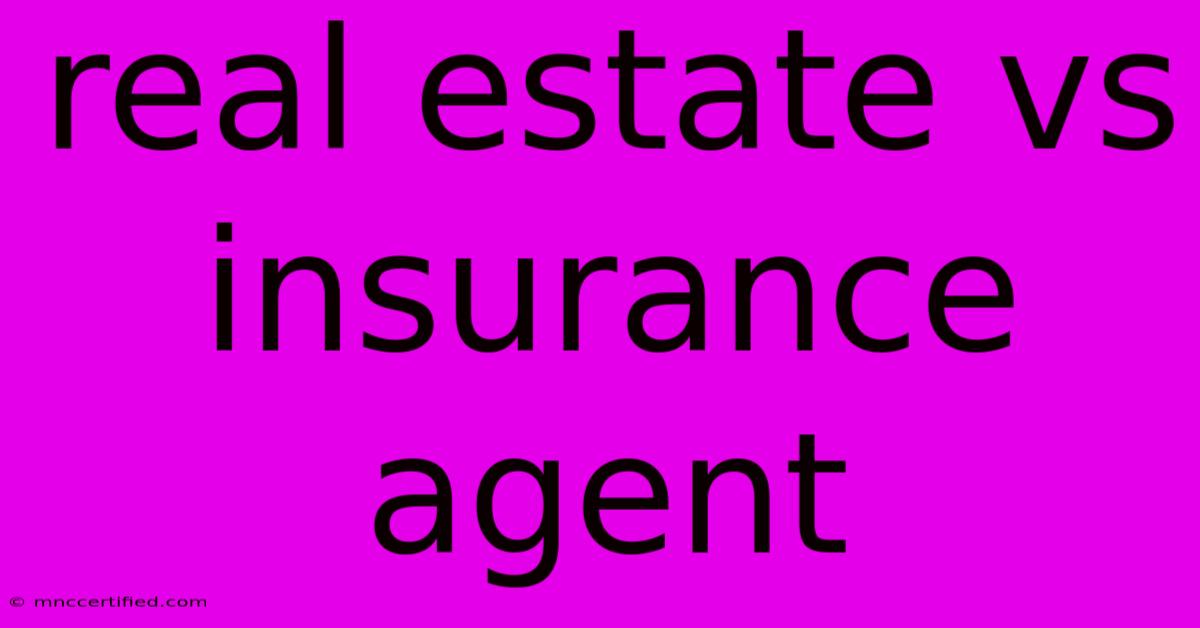Real Estate Vs Insurance Agent

Table of Contents
Real Estate Agent vs. Insurance Agent: Which Career Path Is Right for You?
Choosing a career path can be daunting, especially when faced with two seemingly lucrative options like real estate and insurance. Both offer the potential for high earnings and flexibility, but they require vastly different skill sets and approaches. This comprehensive guide will delve into the key differences between these two professions, helping you determine which aligns better with your personality, skills, and aspirations.
Understanding the Roles: Real Estate vs. Insurance
Before diving into the specifics, let's establish a clear understanding of each profession:
Real Estate Agent: A real estate agent acts as an intermediary between buyers and sellers of properties. Their responsibilities include:
- Listing properties: Marketing homes for sale, taking professional photos, and writing compelling property descriptions.
- Showing properties: Conducting tours for potential buyers, answering questions, and highlighting key features.
- Negotiating offers: Representing clients' best interests during negotiations, ensuring favorable terms.
- Managing paperwork: Handling contracts, disclosures, and other legal documents.
- Building client relationships: Cultivating long-term relationships with buyers and sellers through exceptional service.
Insurance Agent: An insurance agent sells and services insurance policies. Their role involves:
- Assessing client needs: Understanding clients' insurance requirements (home, auto, life, health, etc.).
- Recommending policies: Presenting suitable insurance options from different providers.
- Processing applications: Completing necessary paperwork and submitting applications to insurance companies.
- Managing claims: Assisting clients with filing insurance claims and navigating the claims process.
- Providing customer service: Answering questions, resolving issues, and maintaining strong client relationships.
Key Differences: A Comparative Analysis
While both careers involve client interaction and relationship building, several crucial differences set them apart:
1. Skills and Personality Traits:
- Real Estate: Requires strong negotiation skills, a keen eye for detail, excellent communication skills, marketing savvy, and the ability to handle pressure during transactions. A proactive and outgoing personality is highly beneficial.
- Insurance: Emphasizes strong communication and interpersonal skills, the ability to explain complex information clearly, problem-solving abilities, and attention to detail. A patient and empathetic personality is crucial.
2. Work Environment and Schedule:
- Real Estate: Often involves flexible hours, including evenings and weekends, to accommodate clients' schedules. Work can be demanding and unpredictable, depending on market conditions. The work location can vary widely, from open houses to client meetings in offices or homes.
- Insurance: Typically involves a more structured work schedule, often in an office setting. While some flexibility might exist, regular business hours are common.
3. Income Potential:
- Real Estate: Income is typically commission-based, fluctuating depending on the number and value of sales. High earning potential exists for successful agents.
- Insurance: Income can be a combination of salary and commission, offering greater stability than real estate but potentially lower maximum earnings.
4. Licensing and Education:
- Real Estate: Requires obtaining a real estate license, involving passing an exam and completing pre-licensing education. Continuing education is often needed to maintain licensure.
- Insurance: Requires obtaining an insurance license, also involving exams and pre-licensing courses. Continuing education requirements vary by state and type of insurance.
5. Market Conditions:
- Real Estate: Highly sensitive to market fluctuations, with income directly affected by economic conditions and housing market trends.
- Insurance: More stable than real estate, though influenced by economic factors and insurance market trends. Demand for insurance remains relatively consistent.
Which Career Is Right for You?
The best career path depends entirely on your individual preferences, skills, and risk tolerance. Consider these questions:
- Do you enjoy sales and negotiation? If so, real estate may be a better fit.
- Are you detail-oriented and enjoy problem-solving? Insurance might be a more suitable option.
- Do you prefer a flexible schedule, even if it means inconsistent income? Real estate offers more flexibility.
- Do you prefer a more stable, structured work environment? Insurance offers a more predictable schedule.
Ultimately, researching both careers thoroughly and perhaps shadowing professionals in each field will provide invaluable insights into which path aligns best with your goals and aspirations. Carefully weigh the pros and cons before making your decision.

Thank you for visiting our website wich cover about Real Estate Vs Insurance Agent. We hope the information provided has been useful to you. Feel free to contact us if you have any questions or need further assistance. See you next time and dont miss to bookmark.
Featured Posts
-
Mens Team Wins Overtime Battle Against Notre Dame
Nov 27, 2024
-
Live Manchester City Vs Feyenoord Champions League
Nov 27, 2024
-
Sheffield Vs Oxford Live Championship Match Score
Nov 27, 2024
-
Rare Sighting Freeman At Giorgios
Nov 27, 2024
-
How Does Lyft Verify Insurance
Nov 27, 2024